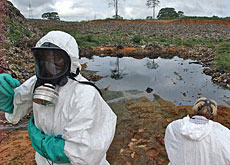
Global action on asbestos runs into trouble

Plans to add the most common form of asbestos to a global "watch list" of hazardous chemicals look set for a stormy ride in Geneva this week.
Swiss officials said on Monday that the move had been challenged by Canada – one of the largest exporters of asbestos – and Kyrgyzstan, and could be shelved for at least another year.
Representatives from more than 100 governments are in Geneva this week to assess progress on the Rotterdam Convention, which regulates the import and export of hazardous chemicals and pesticides.
One of the main goals of the conference is to see chrysotile asbestos, which accounts for around 94 per cent of global asbestos consumption, added to the convention’s list of substances carrying health or environmental risks. This needs the approval of all parties to the treaty.
But according to Thomas Kolly, head of international affairs at the Federal Environment Office, efforts to add the substance to the Rotterdam list have run into trouble.
He told swissinfo that on the opening day of the conference Canada and Kyrgyzstan had challenged the move on a legal technicality. He said their opposition was based on “pure economic interests”.
“Canada has made it very clear that it is opposed to including chrysotile asbestos on the list for the moment,” said Kolly.
“It is unlikely that we will reach a successful conclusion this week in Geneva and that would be a disappointment,” he added.
According to the Geneva-based World Health Organization, at least 90,000 people die from asbestos-related diseases, such as lung cancer and mesothelioma, every year.
Toxic mercury
Under the convention, exports of 39 chemicals and pesticides – including the insecticide, DDT, and highly toxic mercury compounds – require the prior informed consent (PIC) of the importing country.
This gives developing countries in particular the power to decide which potentially hazardous chemicals or pesticides they want to receive, and to exclude those they cannot manage safely. Exporting countries are responsible for ensuring that unwanted substances do not leave their territory.
Kolly said the continued omission of chrysotile would not affect Switzerland where asbestos has been banned since 1989. But he warned that it would pose an ongoing problem for developing countries where checks and controls are less rigorous.
“On the international level it is a bad thing that we cannot come to a decision on this,” he said.
Solution needed
But the United Nations Environment Programme (Unep), which along with the Food and Agriculture Organization provides the secretariat for the convention, said it was still hopeful that some kind of solution could be found before the conference ended on Friday.
Unep spokesman Michael Williams said one possible scenario might see a decision postponed until 2008.
“It’s not a good strategy to simply allow discussion to end with a ‘no’. It makes sense to buy time and leave the door open and keep talking,” he told swissinfo.
“It’s an important issue and our assumption is that it will either be added to the list this week or talks will continue. But this week will not be the end of the game for asbestos.”
The global construction union, the Building and Wood Workers’ International (BWI), which is campaigning for a global ban on asbestos, described Monday’s developments as very disappointing and an embarrassment for the Canadian government.
“It’s extraordinary that in 2006 Canada is still blocking this despite all the medical evidence about the dangers of asbestos,” said Fiona Murie, the BWI’s director of health and safety.
swissinfo, Adam Beaumont in Geneva
The permanent seat of the Rotterdam Convention is shared between Geneva and the Italian capital, Rome.
There are 39 chemicals listed in the convention and subject to the PIC procedure, including 24 pesticides, four severely hazardous pesticide formulations and 11 industrial chemicals. Many more chemicals are expected to be added in the future.
Five forms of asbestos – actinolite, anthophyllite, amosite, crocidolite and tremolite – are already on the PIC list.
Earlier this year the International Labour Organization adopted a resolution calling for the elimination of all uses of chrysotile.
The Rotterdam Convention was adopted in September 1998.
Switzerland ratified the treaty in January 2002.
The convention finally came into force in February 2004.

In compliance with the JTI standards
More: SWI swissinfo.ch certified by the Journalism Trust Initiative
















![The four-metre-long painting "Sonntag der Bergbauern" [Sunday of the Mountain Farmers, 1923-24/26] had to be removed by a crane from the German Chancellery in Berlin for the exhibition in Bern.](https://www.swissinfo.ch/content/wp-content/uploads/sites/13/2025/12/01_Pressebild_KirchnerxKirchner.jpg?ver=14ffbad8)













You can find an overview of ongoing debates with our journalists here . Please join us!
If you want to start a conversation about a topic raised in this article or want to report factual errors, email us at english@swissinfo.ch.